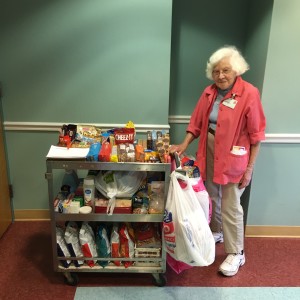Clone this woman. Steal this idea.
Here’s my latest article on McKnight’s Long-Term Care News:
Clone this woman. Steal this idea.
A few months ago, I was consulting at the Margaret Tietz Nursing and Rehabilitation Center in Jamaica, NY, when a remarkable woman named Trudy Schwarz walked down the hall. Her noteworthy qualities were obvious in several ways.
A diminutive woman, she nevertheless was pushing a sizable rolling metal cart filled with all manner of neatly arranged goods. This was despite being as old or older than many of the residents at the facility.

She exuded a calm, pleasant demeanor enhanced by her smile and her peach-colored lab coat as she purveyed merchandise from what I’ve previously termed an “independence cart,” an essential yet rare enterprise in long-term care.
“Trudy’s here!” exclaimed the resident I’d been speaking with, excusing herself for a moment to exchange a few dollars for a bottle of lotion. “She buys me the things I can’t get here. She’s a real lifesaver.”
It was a sentiment I heard echoed by many other residents over the next few months.
Overcoming systems failure
An “independence cart” is a small store on wheels that brings goods to residents. While many residents have personal needs allowances and therefore a small amount of money for purchases, it’s virtually impossible for many frail elderly to spend it due to a systems failure within long-term care communities.
Residents generally have no access to a store unless it’s one that visits their facility or they’re physically able to go off-campus with a family member or as part of a staffed excursion. Social workers are usually too inundated with other tasks to assist with online purchases and most residents don’t have access to a credit card, debit card or PayPal account necessary for web-based transactions anyway. Residents without family members to make purchases on their behalf are left to ask for help from staff members who sometimes assist them out of kindness — but against facility policy.
The psychological impact

